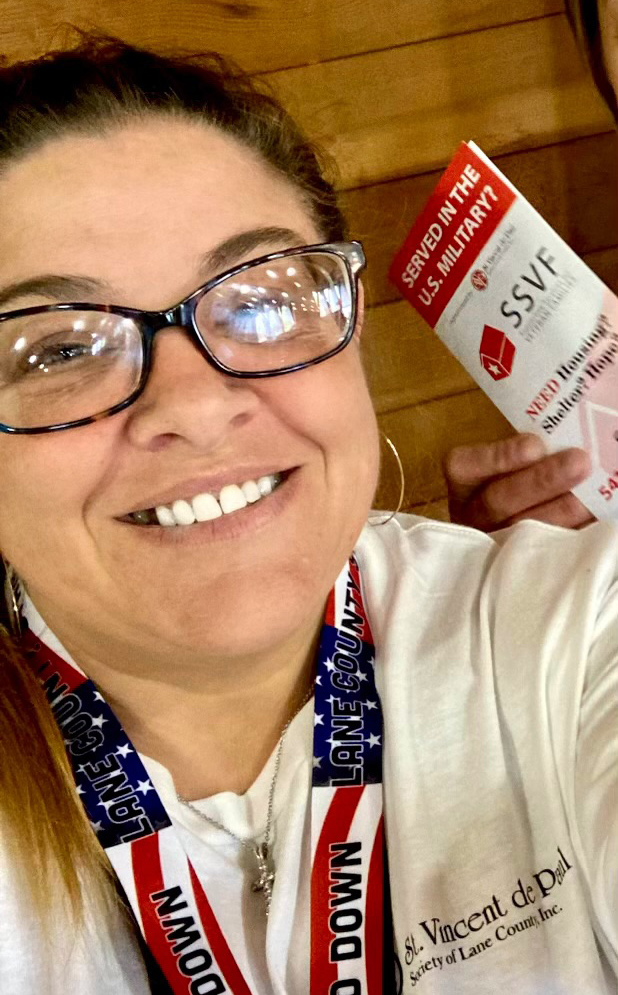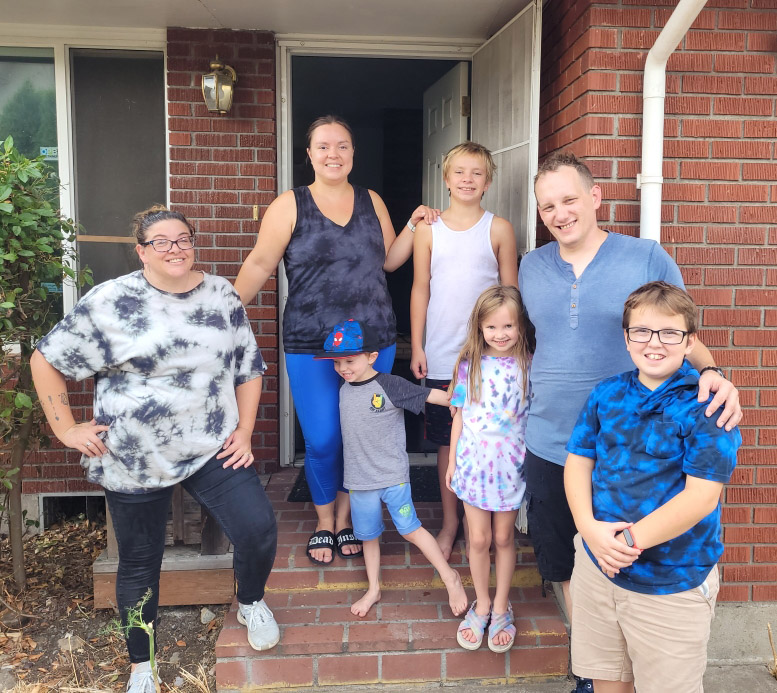 Krysta Matsen is not a Veteran herself, but she’s no stranger to the struggle that prompts many to seek help from Supportive Services for Veteran Families (SSVF) to avoid homelessness and achieve stability.
Krysta Matsen is not a Veteran herself, but she’s no stranger to the struggle that prompts many to seek help from Supportive Services for Veteran Families (SSVF) to avoid homelessness and achieve stability.
In fact, before she joined SSVF as a Rapid Rehousing case manager in June 2022, Krysta and her family experienced homelessness themselves in 2016. That prompted them to seek assistance through another St. Vincent de Paul-administered program, Connections Rapid Rehousing. Connections serves qualifying unhoused Lane County families with children, by providing personalized case-management, education, referrals and temporary rental subsidies to help them overcome housing barriers and achieve self-sufficiency.
“We just needed somewhere to lay our heads, we needed somewhere to feel safe and secure and stable,” Krysta says, thinking back to when she and her husband, Ryan, reached out to Connections for housing help after moving to Eugene from Roseburg. “And then from there we literally just went up, you know?”
What a difference a few years can make when you have a steadied life and a safe place to call home. Krysta, Ryan and kids have had both of those things ever since getting housed around Christmas time in 2016.
“After being housed, we started gaining life skills very quickly, even the boys. They all played sports and had good grades,” Krysta says of the sons in their blended family — Ryan Jr. and Keanin, who lived with them at the time, and Bryan, the last of their children still at home with them now. Krysta also has two older daughters, Harmony and Dakota, and a grandson, Lain.
Krysta and family continue to be stably housed, thanks in large part to the two-year foundation built through their Connections participation. Ryan works as a Life Change Program counselor at the Eugene Mission, and Krysta is thriving in a fulfilling, full-time job with the very agency that helped put their family on the road to stability.
Not only that, Krysta reflects, “it’s just crazy to me how full-circle my life has come — the fact that I was in the Connections program, and now I get to give back in that same kind of capacity.”
Jumping in with both feet
Krysta had returned to school during her family’s enrollment in Connections, taking courses in case management and related subjects on her way toward becoming a drug and alcohol counselor. She did work for a time in that field, but was unemployed for a couple of months before the opportunity with SSVF arose.
It didn’t take her long to react when she saw that job posting, Krysta says, because “my heart is just for the homeless population.”
And once hired, it wasn’t long before Krysta got a chance to really prove her case-management mettle by helping a large Veteran family in distress.
“I was here about 2 months and I felt like I just got acclimated to the whole process of how the SSVF program works,” Krysta recalls, “when I was handed a case file that included six family members. I was like, ‘Oh, goodness!’ But I was excited because it was a family with kids, and I remembered how big of a deal it was when we got housed.”
She was able to quickly secure housing for the family that had become homeless after their move from Utah to Eugene didn’t go as planned. She helped them address some minor background issues before getting them successfully rehoused with rental subsidy in a three-bedroom duplex.
“They have four kids, and they’d been hanging out, camping in the car, staying in motels and doing stuff to get by all summer,” Krysta says. “A lot of property managers will try to say no because maybe someone doesn’t have income yet or whatever. But I knew we had to get this family housed and ready for school, so I really advocated for them a lot.
“We literally got them housed like a week before school started; it was really awesome!” (Read more about that family’s story.)
Helping Veterans stay “in” life

Krysta Matsen, left, is shown with the Palmer family at the home she secured for them as their SSVF case manager.
Krysta doesn’t have direct military experience or a long history of working with Veterans, as many other SSVF staff do, but she informs her work through a combination of education, training and lived experience with many challenges also common to Veterans fighting for stability.
“I think the drug and alcohol counseling, schooling and experience that I have is really helpful in trying to help homeless people and homeless Veterans,” she says. “Many of them have PTSD and different mental health stuff or substance use going on. I did have a lot of toxic relationships, and my own addictions and things, and a lot of it is being able to talk people through that and just sit with them. I use a lot of the same skills here that I did as a counselor.”
Krysta does recall her grandfather struggling through his post-Vietnam life, which might arm her with additional compassion for clients coming to SSVF for help.
“I didn’t really have a close relationship with him, but I recognize the trauma that he experienced from that time in his life,” she says. “He would drink a lot, disappear and then sometimes show back up. He was in and out of life, like many of the people that I deal with on a daily basis.”
And now that she’s come full circle in her own journey to stability, Krysta is qualified, ready and happy to step in as their reinforcement.
Do you know a family in need of help, or want to help by supporting either of the SVdP-administered programs featured here? Learn more or donate at these links: Supportive Services for Veteran Families and Connections Rapid Rehousing.

